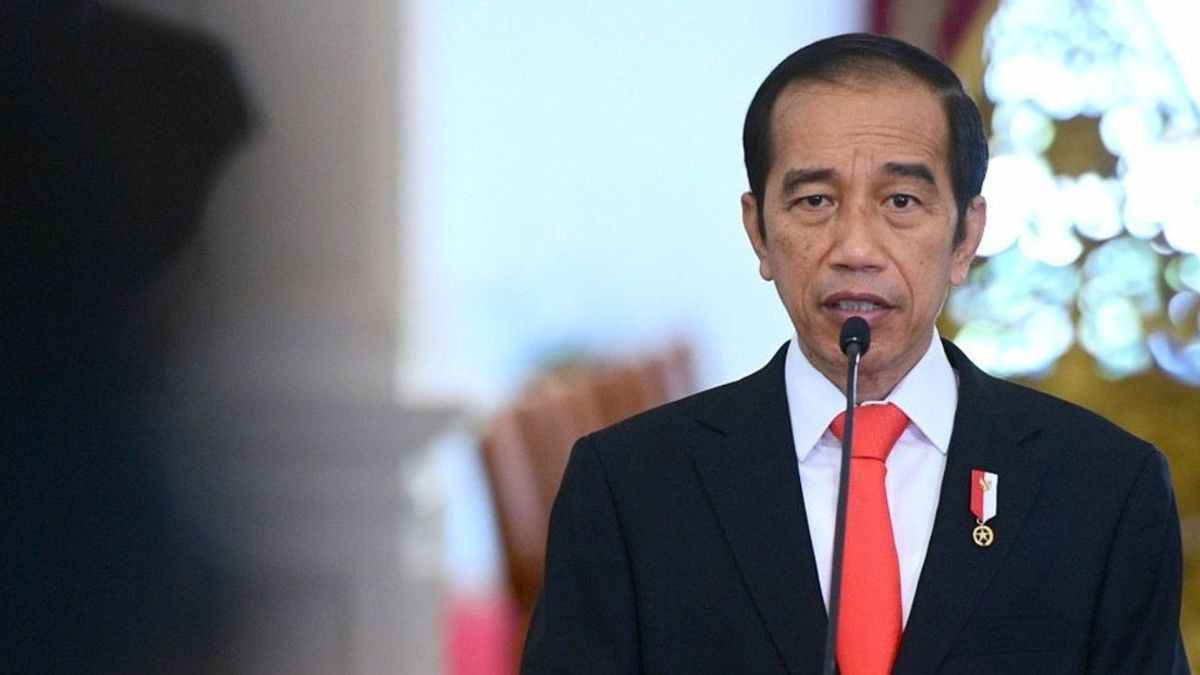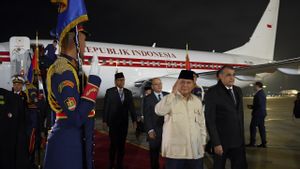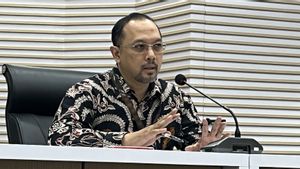JAKARTA - A story about 'The Land of Close Ears'. Many refuse to listen, especially those state officials. Few understand each other. Even students who reject music become blasphemy. Even though we can learn from the students, there are times when it is important to cover our ears, especially for the lip service of the country's leader, President Joko Widodo (Jokowi).
The story begins with a viral video that shows a group of students in a room waiting for their turn for vaccination. In the room there was a rumbling of music. The students sat while covering their ears. There is no detailed explanation of where the incident took place and where the students came from. What is clear is that the video provoked a commotion.
"Masha Allah, our students are queuing for vaccines... Qodratullah, music is playing at the vaccine area. You can see if our students are covering their ears so they don't listen to this music," a male voice recording video, allegedly a teacher of the students, explained the situation in the area. location.
A number of parties commented on the principles and beliefs of the students, including Deddy Corbuzier. Deddy's comment was tucked away in Diaz Hendropriyono's upload, who also uploaded the viral video of the students. Diaz, in the upload also compares how Arabs in khafiyeh and robes dance to the sound of music.
"Meanwhile... Poor, from a young age they have been given the wrong education. There's nothing wrong with having a little fun," Diaz wrote.
Deddy pinned a comment, "Maybe they are using airpods. It's annoying... Right."
Diaz then replied, "Pinteeeerrrr," with an applause emoticon.
The interaction between the two in public spaces has become the focus of netizens. They criticized Deddy and Diaz's insensitive attitude towards the principles and beliefs of the students. "Astaghfirullah, they say tolerance, but julid. If it is true tolerance, respect, not cynicism," wrote @bugioclothing. Many similar comments questioned the attitude of Deddy and Diaz.
Before Deddy and Diaz, social media users with 1.1 million followers, Denny Siregar was not absent from narrating his cynicism. On his Instagram account, the person who seems to be the most tolerant and Pancasilaist uploaded a video of the students with the caption: If I'm the officer, I'll immediately follow them Metaliica. Exit light... Enter night.
Eko Kuntadhi, a friend of Denny's, who also often talks about tolerance, Pancasila, and his inner 'redness', also uploaded the video's content on his Twitter account. In the upload, Eko marked the official account of the composer, Addie MS. "Mas @addimes must have shed tears watching this video. Poor our children," wrote Eko with his narration.
Others view the reactions of the students in a clearer perspective. For them the students actually showed a high level of tolerance. Instead of asking the organizers to turn off the music, they opted for earmuffs. The Indonesian Ulema Council (MUI) has also confirmed that the attitude of the students is normal. So it's not a picture of radicalism as many people have accused it of.
"This santri child is indeed properly guarded by memorizing the Koran. Do not listen to things that can interfere with memorizing concentration. One of them is music. Sounds, yes, not only music," said Deputy Secretary General of MUI M Ziyad.
Gadjah Mada University sociologist Suprapto also highlighted the intolerance shown by Deddy, Diaz, Denny, and Eko. It is nothing. All of these public figures are parties who often speak out about tolerance and diversity. But in fact they do not really understand what tolerance is. They should learn from the students.
"If we understand each other, give function, human life can be very comfortable. But not everyone wants or can take and give. We take something, flatten something from others, but we should also be able to 'give' meaning to give meaning or understand what we do other people as long as they don't disturb us," said Suprapto, contacted by VOI, Tuesday, September 14.
Learn to cover your ears from Jokowi's lip service exposureIn the midst of this crowd, a Twitter account, @DonAdam88 uploaded a tickling video. The video shows two men sitting and covering their ears when Jokowi's speech is heard at the Meeting with ASEAN and Australian Entrepreneurs in Sydney, March 17 2018. "There's nothing wrong to have a lot of fun," the caption reads.
There's nothing wrong to have a lot of fun.... pic.twitter.com/spcU5zFZNN
— M. Adamsyah WH (@DonAdam68) September 14, 2021
Jokowi, his speeches, and his statements are well-known objects of public attention. Last July, the University of Indonesia's BEM (BEM UI) action received wide attention. In a study, BEM UI dubbed Jokowi as the King of Lip Service. The reason is that Jokowi's words often do not match reality. BEM UI is not the origin of the mention. They proved through this simple study.
"This is a form of criticism that many of the President's statements have not been in accordance with reality or their implementation," said BEM UI Chair Leon Alvinda Putra to VOI, Tuesday, June 29.
There are at least three foundations that underlie the nickname King of Lip Service. The first is the revision of the Electronic Transaction Information Law (ITE). At that time, Jokowi asked the DPR to revise it. But what is currently happening is that a new article appears and is considered not a solution.
"Regarding the revision of the ITE Law, the President conveyed that regarding the discourse (revision) of the ITE Law, what came out was the SKB guidebook (joint decree). Then a new article was added which has the potential to then add rubber articles to the ITE Law, namely (article) 45c, " said Leon.
Furthermore, BEM UI also highlighted Jokowi's statement about his longing to be demonstrated. In fact, what happened was that students who staged demonstrations were arrested and subjected to violence by the police.
"We know there is a statement from the President who misses demonstrations. But when the students demonstrated, for example, on May 1, UI students nearly 30 (people) were arrested, beaten, dragged by the police. On May 3, one of the UI students was also a suspect on the way home from the action. " he insisted.
Finally, about the National Insight Test (TWK). BEM UI assessed that Jokowi's statement which had responded to this matter was not very firm. At that time, Jokowi said that TWK was not the basis or reference for firing dozens of KPK employees.
However, in reality, dozens of KPK employees are still threatened with being fired on the grounds that they cannot be nurtured. "We convey that President Jokowi should be strict with his statement. Don't just express opinions but the reality is not appropriate," said Leon.
Is this criticism still relevant today? Regarding the ITE Law, until now the progress of the revision of the ITE Law is still dark. The implementation of the rubber article is still worrying. Then about the longing to be demoed. We know that last Tuesday, September 7, a farmer in Blitar was arrested.
The man with the initial S was taken away by the police because he unfurled a poster that read "Pak Jokowi Help Farmers Buy Corn at a Reasonable Price." Really, the poster couldn't even be called a critique. It's a request for help.

"Indeed, many of the policies of the Jokowi administration are anti-people and go against their own promises ... the incident shows the actions of some government officials who are anti-people," Amnessty International Indonesia Executive Director Usman Hamid told VOI.
It doesn't stop there. Jokowi's visit to Sebelas Maret University (UNS), Solo, Monday, September 13 was also marked by the arrest of students. They were arrested by the police and also spread posters containing requests for help on the side of the road that Jokowi was passing.
"Sir, please fix the KPK."
"Resolve past human rights violations."
President of BEM UNS Zakky Musthofa questioned the police's repressive attitude. He was sure that no violation of the law had been committed. According to Zakky, ten students were arrested. Jokowi himself went to UNS to open the Indonesian Chancellor Forum meeting. He was accompanied by the Minister of Education, Culture, Research, Technology and Higher Education, Nadiem Makarim.
This attitude certainly has to be questioned. First, freedom of expression is regulated by various legal foundations, such as Articles 19 and 21 of the International Covenant on Civil and Political Rights (ICCPR), which Indonesia has also ratified through Law No. 12 of 2005 and is further explained in General Comment No. 34 regarding Article 19. ICCPR.
In national law, the right to freedom of expression is also guaranteed in the 1945 Constitution, in particular Article 28E Paragraph (3), and also Article 23 Paragraph (2) of Law No. 39/1999.
"Freedom of expression can only be subject to restrictions as prescribed by law and necessary to protect public safety, order, health or morals or the basic rights and freedoms of others," said Usman Hamid.
*Read other information about NATIONAL NEWS or read other interesting articles from Yudhistira Mahabharata.
Other BERNASThe English, Chinese, Japanese, Arabic, and French versions are automatically generated by the AI. So there may still be inaccuracies in translating, please always see Indonesian as our main language. (system supported by DigitalSiber.id)








